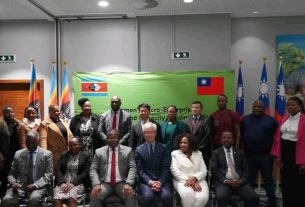BY BANELE MAGONGO
MANZINI – Owners of micro, small and medium enterprises (MSMEs) in Eswatini are given an opportunity to meet with their counterparts in order to find solutions to their problems.
The opportunity has been extended by the recently-established Eswatini Micro Small & Medium Enterprises Chamber of Commerce (EMSMECOC). The EMSMECOC says the small business owners should join the organisation so that they can work together in dealing with their problems. The joining is free of charge.
This was said by EMSMECOC Chairperson Masotsha Dlamini during the pre-launch of the organisation today (Friday, August 9, 2024) at the Chinese Restaurant, Manzini Lifestyle Centre.
Dlamini emphasised the need to address the challenges facing MSMEs in Eswatini, highlighting issues such as limited access to finance and restricted access to markets.
He stressed that these issues hindered the growth and sustainability of MSMEs, and that Eswatini Micro Small & Medium Enterprises Chamber of Commerce (EMSMECOC) aims to address these issues. Dlamini then went on to introduce the organisation and its objectives, outlining the vision for a more supportive environment for MSMEs in the country.
Dlamini continued by pointing out another major challenge faced by MSMEs, the lack of access to training and capacity-building opportunities. Without adequate skills and knowledge, entrepreneurs struggle to manage and grow their businesses effectively. He further highlighted that navigating the regulatory environment can also be challenging for MSMEs, adding to their difficulties in reaching their full potential.
He asserted that these obstacles significantly impact the MSME sector, leading to high failure rates and limiting their contribution to the economy in terms of job creation and growth. This is why the Eswatini MSME Chamber of Commerce was established, to address these challenges and provide assistance to local entrepreneurs, helping them overcome these obstacles and thrive.
Dlamini emphasised the critical role of MSMEs in global economies, highlighting the support given to these businesses by international and regional organisations. The International Trade Centre (ITC) and the World Bank have undertaken significant initiatives to enhance MSME competitiveness, while the African Union has recognised MSMEs as a crucial factor in the success of the African Continental Free Trade Area (AfCFTA).
Within the Southern African Development Community (SADC), policies have been implemented to facilitate MSME growth, and the Eswatini government has persistently supported MSME development as a key driver of economic growth and job creation.
Highlighting the importance of their efforts, Chairperson Dlamini reiterated that the work of Eswatini MSME Chamber of Commerce aligns with the United Nations Sustainable Development Goals (SDGs).
He emphasised that MSMEs are essential in achieving specific SDGs, such as Goal 8 (decent work and economic growth), Goal 9 (industry, innovation, and infrastructure), and Goal 10 (reducing inequalities). By empowering MSMEs, the organisation believes it is contributing to a more sustainable and equitable future for all.








